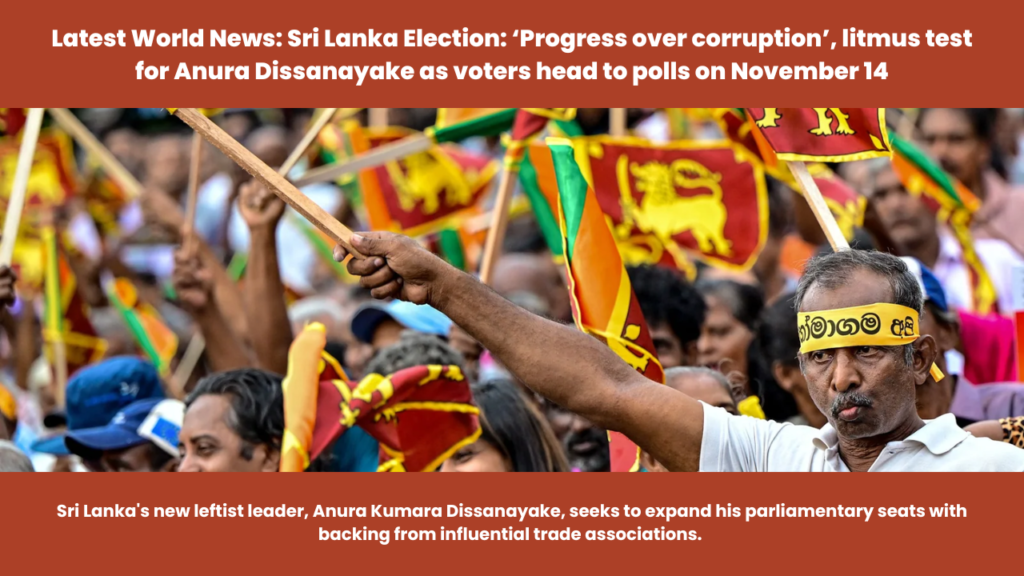Sri Lanka‘s new leftist leader, Anura Kumara Dissanayake, has gained unexpected support as he aims to expand his three parliamentary seats into a majority in Thursday’s elections.

As reported by AFP, the 55-year-old president, who admires figures like Karl Marx and Che Guevara, has secured backing from the country’s largest and most influential private sector trade and industry association.
Dissanayake assumed power in September, fueled by widespread public frustration over Sri Lanka’s 2022 economic collapse. The Ceylon Chamber of Commerce (CCC) has endorsed his economic recovery proposals, noting that they align with the socialist agenda of his People’s Liberation Front (JVP).

Business leaders have speculated that Sri Lanka could adopt economic models similar to those of China or Vietnam under Dissanayake, whose party logo prominently features the hammer and sickle, symbolizing its communist ideology.
“In the first term (of Dissanayake), I would say that they will be far better than Vietnam in terms of having a full democratic setup”, said Imran Furkan, from the Australia-based geopolitical risk analysis firm Tresync, as reported by AFP.
“Democracy is deeply rooted in Sri Lanka, unlike in Vietnam, which has been communist for a long time”.

Furkan said he expected Dissanayake’s party to comfortably win Thursday’s parliamentary elections and then pursue reforms, including unpopular austerity measures begun by his right-wing predecessor Ranil Wickremesinghe in line with a $2.9 billion IMF bailout.
Stocks surge
The JVP, which was responsible for armed uprisings in 1971 and 1987 that resulted in around 80,000 deaths, has since shifted to mainstream politics, forming a coalition with professional groups known as the National People’s Power (NPP).
By allowing the debt deal negotiated by former President Wickremesinghe to proceed, Dissanayake has gained the trust of both domestic and international investors, who believe he will uphold the ongoing reforms, according to Furkan.

Following Dissanayake’s election, the Colombo Stock Exchange’s All Share Price Index has risen by 16.65%, reflecting strong investor confidence.
Dissanayake has also maintained strong ties with both India, Sri Lanka’s giant neighbor, and China, the country’s largest bilateral lender. These two powers compete for influence over the small but strategically important Indian Ocean island, home to a majority Buddhist population of around 22 million.
Voting for the parliamentary elections will begin Thursday at 7:00 am (0130 GMT), with 8,880 candidates vying for 225 seats. Initial results are expected as early as Friday morning. However, election monitors have noted a lack of enthusiasm among voters. The People’s Action for Free and Fair Elections (PAFFREL) has warned that voter turnout could fall below the 80 percent seen in the presidential election.
PAFFREL head Rohana Hettiarachchie said the results were seen as a foregone conclusion given how few opposition party candidates were active.

Dissanayake’s party had only three seats in the outgoing legislature but faces little challenge this time.
“Campaigning from the opposition side is very, very low,” he said, while noting that campaigns, unlike in the past, had at least been peaceful.
‘Unity over division’
CCC chief Duminda Hulangamuwa has not only endorsed the new administration’s plans but has also taken on an honorary role as Dissanayake’s economic adviser.
In an interview last week, Hulangamuwa explained that Dissanayake aims to continue with the IMF bailout, which necessitates reforms to loss-making state-owned enterprises, as well as the removal of subsidies and tax breaks, AFP reported.
Dissanayake’s approach, according to Hulangamuwa, focuses on implementing these reforms first and then achieving macroeconomic stability, with a goal of fostering “growth in a more inclusive manner.”

Ex-president Wickremesinghe was voted out of office after doubling income taxes and imposing other reviled austerity measures.
His policies ended the shortages of essentials such as food, fuel and medicines, along with runaway inflation, and returned the country to growth, but left millions struggling to make ends meet.
The IMF has acknowledged that Wickremesinghe’s administration made substantial strides in stabilizing Sri Lanka’s finances after the country’s $46 billion foreign debt default in 2022.
The IMF is scheduled to send another mission to Colombo on election day to assess the progress, having previously stated that .
0 is “not out of the woods yet.”
Anura Lokuhetty, an executive in the hotel sector, emphasized the need for a stable government to ensure continued economic recovery.
“Now that we have a president from the NPP, the parliament should support the system to carry on a good environment for business,” Lokuhetty told AFP.
Lawyer Shanthini Walgama said Dissanayake’s coalition offered the best promise of tackling endemic corruption.
“In this election, it is all about progress over stagnation, unity over division, honesty over corruption,” she told AFP.


